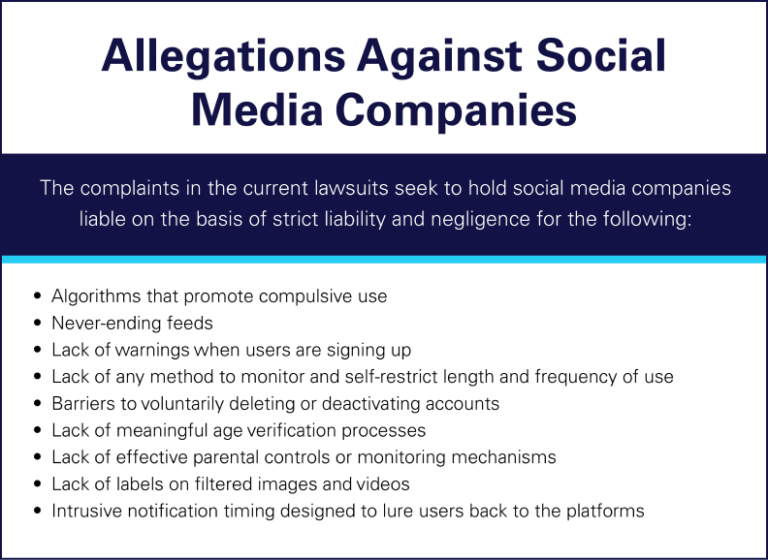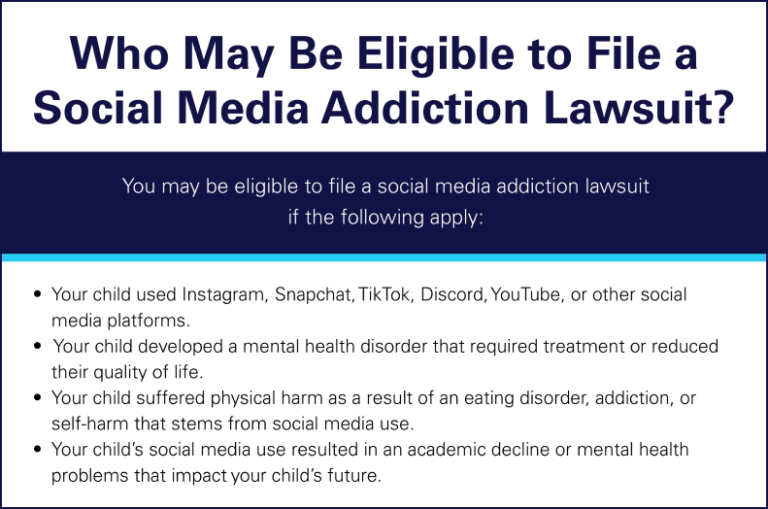Social Media Addiction Lawsuit
Thousands of social media addiction lawsuits are being filed against major platforms, including Facebook, Instagram, Snapchat, TikTok, YouTube, and Discord. Lawsuits allege the companies intentionally designed their platforms to be addictive to children and teens without warning of the mental and physical harm that would follow.

- Content last updated on:
- June 30, 2025
Written and edited by our team of expert legal content writers and reviewed and approved by

- Content last updated on:
- June 30, 2025
- October 2024 Updates on Social Media Addiction Lawsuits
- Industry Leading Social Media Addiction Lawyers
- Which Social Media Platforms Are Being Sued for Addiction?
- Why Are Social Media Platforms Liable for Addiction?
- Who Is Joining the Social Media Lawsuits?
- What Damages Are Available in a Social Media Addiction Lawsuit?
- Who May Be Eligible to File a Social Media Addiction Lawsuit?
- When Should You Contact a Social Media Addiction Lawyer?
- How Long Do You Have to File a Social Media Addiction Lawsuit?
June 2025 Updates on Social Media Addiction Lawsuits
Court Ruling Opens the Door for Social Media Addiction Lawsuits Against Big Tech
In a case management conference on June 13, a judge selected six school districts’ cases and five individual plaintiffs’ cases to serve as the bellwether trials in the Social Media Addiction multi-district litigation (MDL). The school districts, chosen across six states to reflect geographic and socioeconomic diversity, each allege that social media platforms have contributed to a growing mental health crisis among their student populations. The districts include:
- Board of Education of Harford County (Maryland)
- DeKalb County School District (Georgia)
- Breathitt County Board of Education (Kentucky)
- Irvington Public Schools (New Jersey)
- Tucson Unified School District (Arizona)
- Charleston County School District (South Carolina)
In MDLs involving both individual and institutional plaintiffs, like school districts, institutional plaintiffs are often tried first. The bellwether trials will help shape the settlement value of the cases to follow and provide insight into how juries respond to evidence linking youth mental health deterioration to the design and operation of social media platforms.
In addition to the six school districts’ cases, the court selected five individual plaintiffs’ cases whose trials will be second in line. These cases were filed by families of young users who suffered psychological harm after prolonged exposure to social media. Though trial dates have not yet been set, the first bellwether case is expected to begin sometime in 2026.
Court Ruling Opens the Door for Social Media Addiction Lawsuits Against Big Tech
A federal court’s ruling in the social media addiction litigation marks a significant step toward holding Meta, Snap, and other platforms accountable for the harm they inflict on young users. While the court dismissed some claims due to Section 230’s broad protections, it rightfully allowed negligence claims to proceed, recognizing that these companies may have designed their platforms in ways that foster addiction and cause severe mental health harms. Wrongful death and related claims also remain on the table, provided plaintiffs can prove negligence. This decision underscores the urgent need to challenge Big Tech’s unchecked power and fight for justice for the countless families devastated by their exploitative practices.
Industry Leading Social Media Addiction Lawyers
At the Social Media Victims Law Center, we’re dedicated to fighting for families impacted by social media addiction. Founded by nationally recognized attorney Matthew Bergman, our firm was created in response to the powerful testimony of Frances Haugen, the first Facebook whistleblower. With extensive experience standing up to major corporations in asbestos litigation, Bergman and our team of leading social media addiction lawyers are committed to holding social media companies accountable for the harm they’ve caused to children and teens.
- Our law firm is representing more than 1,200 parties in social media addiction lawsuits, and this number is growing.
- Matthew Bergman is nationally recognized as a Top 100 National Trial Lawyer
- Our team has 100 years of combined experience and over $1 billion recovered from large companies for injured individuals.
If your child has been harmed by social media, you have the right to hold the company accountable. Our social media addiction lawyers will provide you with vigorous representation and compassionate support. Contact us today for a free consultation.

FOUNDING ATTORNEY
“We anticipate that 2025 will be a year of robust litigation, in which more families come forward to hold companies accountable for the carnage that social media platforms have inflicted on our young people…we have no doubt that this is going to be a long, hard slog but we know that now we at least have a path forward.”
Which Social Media Platforms Are Being Sued for Addiction?
All of the major social media companies rely on addictive algorithms and promote harmful content to increase engagement and keep users online as long as possible. The following companies are named in the social media addiction lawsuits:
Meta Platforms
Meta is the owner of Facebook, Instagram, and WhatsApp. Through addictive algorithms and the promotion of harmful content, Facebook and Instagram lure young users into staying on their platforms for unhealthy lengths of time and continually checking their social media throughout the day.
Our Facebook addiction lawyers are have filed multiple lawsuits against Meta for causing mental health harm in children and teens.
TikTok
TikTok is an incredibly addictive platform that serves users with numerous types of harmful content, including the dangerous “blackout challenge.” This dangerous practice of encouraging users to strangle themselves until they lose consciousness continues to cause the preventable deaths of young children.
The Social Media Victims Law Center represents more than 10 families of children who died while attempting the blackout challenge in TikTok lawsuits. Plaintiffs include a 12-year-old girl who developed an eating disorder that led to hospitalization and permanent damage to her reproductive organs after TikTok detected her interest in exercise and repeatedly served her videos promoting anorexia.
Snapchat
Snapchat is a popular social media platform among youth that is well-known for its disappearing messages, a feature that makes the platform appealing to sexual predators.
Our law firm represents parents whose children have suffered the following harm:
- Sexual abuse
- Suicide, including cases posted live on Snapchat
- Exposure to sexually explicit material through disappearing messages
- Connections with drugs that were laced with fentanyl, resulting in overdose deaths
- Development of a negative body image and harmful eating behaviors
Learn more about our current lawsuits against Snapchat.
Discord
We are currently involved in a case against Discord in which a sexual predator contacted a young girl on Roblox, a children’s gaming app, and encouraged the girl to move to Discord, where she was exploited by several men.
Why Are Social Media Platforms Liable for Addiction?
Plaintiffs allege that the social media companies owed a heightened duty of care because the complaints involve minors. According to the complaint, the social media companies knew or should have known that their products could cause harm, yet they failed to mitigate the risk of harm or warn users about the risk.
The complaints in the current lawsuits seek to hold social media companies liable on the basis of strict liability and negligence for the following:
- Algorithms that promote compulsive use
- Never-ending feeds
- Lack of warnings when users are signing up
- Lack of any method to monitor and self-restrict length and frequency of use
- Barriers to voluntarily deleting or deactivating accounts
- Lack of meaningful age verification processes
- Lack of effective parental controls or monitoring mechanisms
- Lack of labels on filtered images and videos
- Intrusive notification timing designed to lure users back to the platforms

Are Social Media Platforms Immune to Liability?
Social media platforms have long hidden behind Section 230 of the Communications Decency Act, claiming the 1996 law gives them immunity.
While Section 230 does protect social media companies from liability for what users post, it does not give them the freedom to promote the worst content in any way they please.
Our cases against the social media companies do not attempt to hold them accountable for the content users post. Rather, we are holding social media companies accountable for their own actions with regard to their use of the content.

FOUNDING ATTORNEY
“Section 230 has been liberally construed far beyond its language or intent, and until recently had been seen as a veritable carte blanche for social media companies to operate with complete immunity.”
If the plaintiffs prevail, social media companies will finally be forced to stop misusing Section 230 and the First Amendment as blanket immunity when they exploit children for unreasonable financial gain.
Who Is Joining the Social Media Lawsuits?
Parents aren’t the only ones who have taken notice of social media addiction in youth.
- School districts throughout the nation have joined the litigation due to the increased resources they are having to invest in mental health professionals because of the harmful effects of social media.
- Attorneys general in 42 states have filed social media addiction lawsuits because social media companies misled the public about the dangers of social media while profiting from children’s pain.
- United States Surgeon General Dr. Vivek Murthy issued a public advisory urging all Americans, including technology companies, to take immediate action to protect our nation’s youth.
Social media companies have yet to answer the call. Instead, they have shown that they will continue to prioritize profits over safety until forced to do otherwise through lawsuits and public policy.
What Damages Are Available in a Social Media Addiction Lawsuit?
A social addiction media lawsuit is a means to make social media platforms compensate families and children for harm. It is not uncommon for families to incur significant debt and even quit their jobs in an effort to get their children treatment for the mental health disorders, drug addiction, and physical injury brought on by social media use.
Social media addiction lawsuits can help families recoup these losses and receive compensation for the pain and suffering they and their children have experienced.
Ideally, punitive damages may also be awarded to plaintiffs as a means to punish social media companies and deter them from continuing to promote harmful products.
Who May Be Eligible to File a Social Media Addiction Lawsuit?
You may be eligible to file a social media addiction lawsuit if the following apply:
- Your child used Instagram, Snapchat, TikTok, Discord, YouTube, or other social media platforms.
- Your child developed a mental health disorder that required treatment or reduced their quality of life.
- Your child suffered physical harm as a result of an eating disorder, addiction, or self-harm that stems from social media use.
- Your child’s social media use resulted in an academic decline or mental health problems that impact your child’s future.
Learn more about who can file a social media addiction lawsuit.

When Should You Contact a Social Media Addiction Lawyer?
The best time to contact a social media addiction lawyer is as soon as you suspect your child may be suffering negative effects from social media. You may notice changes in your child’s personality, grades, and mental health, including the following:
If your child experiences any of these effects, contact a social media addiction lawyer immediately. An experienced attorney at our firm can take you through the steps to file a social media addiction claim. It is never too early to enlist the help of a qualified attorney.
How Long Do You Have to File a Social Media Addiction Lawsuit?
The time a parent or guardian to file a lawsuit on behalf of their child or teen’s addiction to social media may vary based on their state’s statute of limitations. Our attorneys can help you understand eligibility requirements and how your state’s statute of limitations affects your social media addiction claim.

ATTORNEY
“Regardless of the circumstances, it’s important to be aware that a clock is ticking from the moment you become aware of the harm – or even before. Therefore, it’s recommended that if you’re considering legal action, you should consult an attorney as soon as possible.”
Social Media Addiction Case Review
Our firm fights for children and teens harmed by their addiction to social media